#New York City managed IT service providers
Text
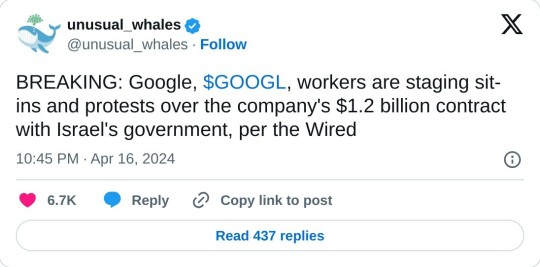
Dozens of Google employees began occupying company offices in New York City and Sunnyvale, California, on Tuesday in protest of the company’s $1.2 billion contract providing cloud computing services to the Israeli government.
The sit-in, organized by the activist group No Tech for Apartheid, is happening at Google Cloud CEO Thomas Kurian’s office in Sunnyvale and the 10th floor commons of Google’s New York office. The sit-in will be accompanied by outdoor protests at Google offices in New York, Sunnyvale, San Francisco, and Seattle beginning at 2 pm ET and 11 am PT.
Tuesday’s actions mark an escalation in a series of recent protests organized by tech workers who oppose their employer’s relationship with the Israeli government, especially in light of Israel’s ongoing assault on Gaza.
Just over a dozen people gathered outside Google’s offices in New York and Sunnyvale on Tuesday. Among those in New York was Google cloud software engineer Eddie Hatfield, who was fired days after disrupting Google Israel’s managing director at March’s Mind The Tech, a company-sponsored conference focused on the Israeli tech industry, in early March. Several hours into the sit-ins on Tuesday, Google security began to accuse the workers of “trespassing” and disrupting work, prompting several people to leave while others vowed to remain until they were forced out.
The 2021 contract, known as Project Nimbus, involves Google and Amazon jointly providing cloud computing infrastructure and services across branches of the Israeli government. Last week, Time reported that Google’s work on Project Nimbus involves providing direct services to the Israel Defense Forces. No Tech for Apartheid is a coalition of tech workers and organizers with MPower Change and Jewish Voice for Peace, which are respectively Muslim- and Jewish-led peace-focused activist organizations. The coalition came together shortly after Project Nimbus was signed and its details became public in 2021.
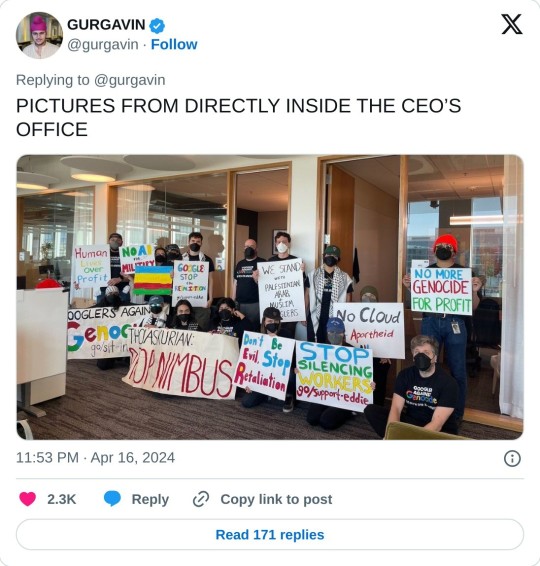
You can read No Tech for Apartheid's open letter here.
#yemen#jerusalem#tel aviv#current events#palestine#free palestine#gaza#free gaza#news on gaza#palestine news#news update#war news#war on gaza#apartheid#gaza genocide#genocide#boycott divest sanction#boycott google#bds movement#Edited
5K notes
·
View notes
Text
Rage | Robber!Frank Castle x Male!R



Summary - The burley “punisher” known for his menacing presence and crimes happened to stumble by your home…
A/N - A simple thought that became something more then it should of, although this has been sat in my drafts for weeks now, I just decided to leave it open, maybe a PT 2 if yall are interested idk…
The night was young.
You sigh, scribbling down notes, anything that came to mind to help with the current case “Murdock and Nelson” was handling.
A series of break-in’s littered the papers of Hell’s kitchen, the bastard had managed to wriggle himself from the grips of the N.Y.P.D, stalking the shadows of the night for his next victim.
Flopping back into your chair, the cushions helped relieve the strain between your shoulder blades from standing a while, bending over the desk that currently wasn’t visible, messy crumbled up balls of paper and yellow documents detailing the certain aspects fitting the onslaught of crime covering the varnished service.
The cool breeze of the city left you shivering and alone reminding you that the law firm you happened to call home for past couple of months was your intake of madness and the decent into a spiralling well of secludedness, you hadn’t had the time to truly enjoy the character Hell’s Kitchen was and will remain.
Once clasping the window shut, you stand, rubbing at your eyes, the tiredness that stuck to them like honey grew thick yet withstand-able, it was if the city was listening, creeping and sauntering, figuring you out, a loud clunk echo’s through your apartment, ringing from wall to wall.
You had guessed it was the stormy weather outside but curiosity killed the cat…didn’t it?
“Fuck-“
Ushering out profanities was your way of coping, taking course of a few steps, gradually making your way to the wooden frame of the door consoling the running thoughts swirling around in your fuzzy brain, you still before turning the bitter-cold handle.
It wasn’t a shock, it almost felt real, more then anything you had witnessed over the past coming months, there he stood, a tall burley man, broad shoulders and toned physique, dressed in all black and a ski mask to cover his identity.
Silence fell over the room but his confidence stood proud, his muscular arms falling to his side underneath the dim light the outside street lamps provided.
“I don’t want any trouble sir-“
You tremble at the thought of becoming his next victim, although he hadn’t killed, the offer still loomed over you like his figure. It wasn’t immediate but you had guessed something within him flicked like a light switch, he placed the bag he managed to fill with stolen goods, your goods, on the floor with the same clunk from before, moving himself closer until he began to invade your space.
“What…do-“
With the incapacity to speak, you stumble back into the wall, his brown hazel’s staring deeply, trying to figure you out. He huffed before licking at his dry lips, closing in on you like an animal with it’s prey, trapping you from a potential exit.
At first he huffed and puffed like the big bad wolf, eyes twitching and lips still, as intimidating as he was, curiosity did infact kill the cat. You waited, keeping your eyes trained on his own, watching for anything.
“You’re a little to curious for your own good”
His voice was low and growly like the worn-down roads of New York City, a shiver ran down the edge of your spine, tingly yet comforting, almost riveting. Although you had no plan of escape nor defense, you melt into the wall keeping you up right, he eyed you up, almost checking to see if you fit the checkbox he had granted himself.
“Are you saying…I gotta be careful from now on?”
You question, hands glued by your sides whilst his block you against the structure of the room. This wasn’t how you expected it to go nor is it how you expected him to be, in ways he seemed softer, almost sweet like your favourite candy dissolving on the tip of your tongue.
He nods confidently, quicker then you would have liked. You can’t help the shakes the ran through your body like a tumble dryer and clothes, eager to figure out what it was that he so desired from you but also to terrified to even speak another word.
“There’s a bad guy out there, he could hurt you, y’know?”
Was it a threat? Or was he simply taking his time? His voice had managed to make you calmer, although being the aggressor, you couldn’t help but reach out, placing a hand on his hard chest, trying anything to communicate.
“Please- please I don’t want this, I-“
Worrisome pleas seemed to do nothing as he stood, still blocking you. The glint in his eyes had changed from dangerous to lustrous within seconds as if he wasn’t here to steal anything but your innocence.
“Don’t you think you could learn a lesson or two?”
A warm hand cups the base of your throat, tightening until your breathing was short-circuited, restricting each intake until you faced him, watching as he tugged a smile onto his plump lips.
Pressing forward, you allow your hand to drop from his chest, his overwhelming presence shifting until his warm breath began to fan against the shell of your ear.
“Never disturb a man whilst he’s at work…”
He presses more firmly with his hand this time making you gasp, choking on the air that seemed to be invading the small space in your lungs. He chuckles before pulling away, essentially playing with his meat, doing everything and anything in his power to make you dumb and nonchalant.
“I- please”
Your ache prolonged, blossoming as you grew harder, he was tall, practically looming over you, closing in and eventually overshadowing you from the light, his burly body blocking you in. A single hand of his cup at one your cheeks, his thumb trailing against your bottom lip in attempts to quieten you.
“God your sweet ain’t ya…”
His mouth was vulgar, his smile stretching as you accept the thumb into your mouth, tongue rolling against the thick digit. Frank could feel himself twitch, it was unusual for his nightly escapades to go like this, it was uncommon for someone to be so inviting, non the less he was entirely enticed by the whole ordeal.
You groan once he pushes deeper, jabbing the palette of your throat causing you gag, tears pricking the corners of your eyes. He couldn’t deny how pretty you were like this which pushed him to pull his now slick digit back with a pop.
Frank doesn’t fight the urge to dip his head low enough to connect your lips, locking you within a searing kiss, one that left you both hungry for more. His tongue, long and wet, rolled smoothly against your own, the material of his disguise rubbing against your upper lip and the tip of your nose, giving enough friction to calm the storm.
It’s chaste and sweet much like he was trying to seduce you which had worked a little to well considering how dumb and weak you had gotten from one touch, one look.
Pulling away with a quick press of his lips, he looks hungrily downward, lips slightly red and lick from the sloppy snog. Still leaning one muscular arm against the wall just to the right above your head, he leans further into you, pressing all of his weight against your front.
That’s when you had felt it, thick and plump underneath his black cargo’s, he settled against your own slowly growing bulge, the continuous roll of his hips relieving the ache as you sigh, practically falling into his chest.
“Just one touch and yer’ dumb for me, for it, come on, show me what i’m missin’ sweetheart”
His hands wrap around your waist once he pulls away, just enough to softly throw you onto the sheets of your bed, his talented hands make quick work of your night shorts and boxers, his eagerness prevailing once they fall into a pool on the carpet.
You hiss when the cold air hits your now oversensitive tip which dripped copious amounts of pre, Frank noticed with a deep chuckle, strong hands pushing up your legs with no resistance as he settles on his knees, hot breath fanning against the back of your thighs.
He takes note of your pale pink hole, salivating at the thought of finally planting his face between the two pert globes you had offered up.
“There he is- fuck look at that”
He wouldn’t ever admit just how hard you had got him, you we’re pretty, a little to pretty, maybe ditzy and a little stupid for letting someone as dangerous as him touch you in ways that had you clutching at the sheets.
“Sir- I can’t, need you-“
Is all you could mutter passed pressed lips, it had been so long, to long since the last time you had gotten intimate with someone, this one took the cake, it was all kinds of strange, only taking note of features shown, the way his eyes had changed to a dark shade of lust, how his lips softly pressed dirty chaste kisses to the skin of your under thighs…why was this happening, you were suppose to help catch the bastard, not fall into bed with him.
“Say that again- wanna hear yer’ beg”
Each kiss led lower until he settled just above your hole, pressing two rough, sloppy kisses to the puckered skin surrounding it, he wanted to hear just how eager you were to finally have him, to finally allow him to dissect you like a butterfly, clip the wings and make you his own.
“Please- I need you, anything-“
He tuts before chuckling one more, the huff of hot breath settling over the coolness of your hole, without any thought, you sink back into the sheets before reaching for the top of his head, with a surge of confidence, you smush his face between your cheeks as he spreads them, feeling him smirk against you was everything, but the long lap, from balls, taint to hole was much more.
He had witnessed the case file you had on him, guessed you were some sort of lawyer working for murdock, it just fuelled his fire, his urge to take control, make you forget, make you understand that he is the man you should fear, but the man you should come running to, it had his dick jump with joy, you were easy but he liked that.
He lapped and lathed at your hole dirtily like some pornstar, eager to uncover the very thing he craved. You could feel the once more slobber roll down from his tongue to your balls, dripping onto the carpet below, shivering in his hold, you begin to push back, wiggling against his face as he noses at your wet clutch.
The tips of two fingers were present, pushing into you alongside his tongue like butter, no resistance, just pure admiration and pleasure, allowing the stranger to ruin your hole, lavish licks and darts of his tongue had you quivering around the intrusion, his fingers smashing in and outwards, scissoring them apart to prepare you for the oncoming assault.
“So easy, just wanna be used? Yer’ that hungry for me? yer’ been stalking me for months and here I am…using yer’ like a damn whore…what would Murdock and Co. think of yer’ spread out and whining for the biggest criminal in Hell’s Kitchen?”
You whimpered at the thought, almost driving you over the edge. He was vulgar and dirty with his words and his tone, deep and low, almost making you dizzy along side the third digit slipping inside, burying themselves to the knuckle making your cock jump.
He smirks against your hole before giving it a few final laps. He pulls them away, standing to glare down at your fucked out features.
“Somethin’ tells me yer’ like the sound of that hmm?”
You watch attentively as his fingers work to unclasp his belt, whipping it off. He unfastens the button, watching as his cargo’s pool around his ankles before kicking them off along with his boxers.
His cock slaps up into his abdomen with a sharp thud. You glare at it, taking it in, judging it harshly. He was big, big enough to leave an impression, he was girthy and long, thick from base to tip, his head an angry shade of red, his balls resting heavily between his thighs, the light shedding of hair framing the beauty.
“Don’t think yer’ gettin’ outta this boy, yer’ gonna take it like the pretty little thing yer’ are”
Peeling off his long sleeved t-shirt, you glaze amongst the muscles that bulged, his physique was godly, heavenly, everything that had your body spreading automatically to give him the space to slot between your legs, kneeling on the edge of the bed.
“Fuck- you look-“
Your words were slight encouragement to Frank as he dipped, still the Ski-mask stayed, secreting his identy, you could still kiss him, sloppy and rough. Whining into the kiss notified Frank of your eagerness, so much so, without warning he pressed the spongy head of his cock against your rim, practically asking for permission.
Breaking the kiss had you back to reality, but it was to late, you mumbled a sharp “yes” allowing him to enter, pushing into your sloppy, slick hole with resistance. You both moan in unison as Frank pushes the air out of your lungs, pushing each inch inward until he sheathed himself fully, now resting against you.
“Atta boy, all the way in with no complanin’, yer’ such a pretty boy ain’t yer’, taking me in all the way like a professional-“
You flutter against him as his arms throw your legs up, pushing them against your stomach giving him enough space to settle just above you, his lips kissing at your jaw, nibbling on the skin as he pulls out, pushing back in slowly to allow you to adjust.
How were you going to explain the current set of events to the law firm and two of the closest men to you, Matthew Murdock and Foggy Nelson, the intimacy of your thoughts only lead you to believe that this would put you at risk…of wanting more.
353 notes
·
View notes
Text
TRIAL BASIS DATING ft ATSUMU MIYA
sfw + no warnings. if the man wants a relationship with you, he’s going to have to work for it. ゚。 ꒱

FIRST TEST: HOLD-MY-PURSE-WHILE-I-TRY-THIS-ON
If New York City had one thing to offer, it was glamour, shopping trips, and luxury. However, this vision of the city seemed to be slightly different for boyfriends, who’d rather view a trip to Soho as an arm workout. Atsumu had to agree.
“Hey, babe?”
The blond perks up at the sound of your voice, looking up at you trying on another pair of nude stilettos, “Hm ?”
“Which ones ?” You say, holding up another pair that was lying nearby, in the mess that was made up of shoeboxes and translucent paper, and placing it next to the shoe that you were currently wearing.
Atsumu can’t help but blink. “Babe.. aren’t they..?” Your pupils narrow down to slits as your boyfriend almost slips up. Luckily for him, he catches the hint, and tries as best as he can to make up for his blunder.
“I mean- No, it’s just.. That’s not what I meant to say! They’re so obviously different, the left one definitely more yellow.. ish?”
You pick up the left one, inspecting it, and Atsumu swears he felt a drop of sweat make it’s way down his forehead.
“Yeah.. Yeah you’re right. Thanks, baby, love you!” As you place a quick kiss on his cheek, you happily saunter over to the store assistant to let her know you’ve made your choice, and, unbeknownst to you, Atsumu feels like screaming into a pillow. Your purse is safely in his hands, he managed to provide worthwhile fashion advice, and most of all, he was still alive.
While he was very self-centered, for once in his life, your boyfriend was sure that the outcome wasn’t any of his doing. In fact, he wholeheartedly believed there was some extraterrestrial being somewhere that had taken pity on him, and helped him out.
Right on cue, you come back, having paid your new shoes, “Come on, hurry up, there’s this other store I wanna check out next!”
Even though these sort of days were definitely rewarding; watching his girlfriend change into form-fitting outfits was always a good thing, Atsumu was already begging for the extraterrestrial’s return.
The colors and brand names you were throwing at him were making the poor man’s head spin; Apple green or Forest green? Ocre or light brown? Prada or Balenciaga? Moschino or Valentino? Atsumu didn’t even know what a Moschino was, and when he’d asked you if it was a coffee machine brand, you had almost thrown earlier’s nude stilettos right at his face.
“Come on, just five more minutes, I promise!” You answer your boyfriend from the changing room, as he had let you know about his need to go back to the hotel as soon as possible.
The blonde, who was sat in a puff chair in front of your changing room, was beginning to get really frustrated at the seemingly endless shopping trip, when he hears the curtains being drawn back. There you were, standing in all your glory, waiting for a comment on his part. Unfortunately for you, your appearance seemed to have made his mouth out of service. His jaw was slacked open, unable to utter a single word out.
“Well ?” You raise an eyebrow.
Maybe an arm workout in Soho wasn’t so bad after all.
note. This is for the girlies who take hours in the changing rooms. I see you, and I get you! Take your time queen you deserve it ゚。 ꒱
©fabraies ALL RIGHTS RESERVED do not copy modify or translate my work/theme
-> second test
#atsumu x you#atsumu fluff#haikyuu atsumu#atsumu scenarios#atsumu x y/n#atsumu x reader#atsumu imagines#haikyuu x yn#haikyuu fluff#haikyuu imagine#haikyuu x y/n#haikyuu drabble#haikyuu x reader#atsumu drabble#hq x you#hq x y/n#hq fluff
502 notes
·
View notes
Text
The Real Deal - Matt Murdock x Witch!Reader

Warnings: I haven't wrote for Daredevil in a long while, so forgive me if i have mistaken details of the show.
Summary: You want to help your lawyers in their most challenging case, but the controversial nature of your skills leaves it up to question.
Tags: @chezagnes
Matt and Foggy meet you as one of their early clients and, in their perspective, you were a simple fortune teller unfortunately caught in a legal issue. Your case was so absurd that it represented easy work for them. Even in the strange times they were living in, it still made no sense. A matter of police profiling through the mass hysteria in the post Loki New York making you suspicious for carrying symbols of norse witchcraft. Runic readings weren't the only service you offered and your practices weren't culturally límited to what then started to be considered an asgardian danger. However, society was still adapting to the discovering and the clueless officers couldn't tell the difference between an asgardian sorceress and the neighborhood's witch. Your lawyers realized of that, and the instant fondness of you that at least half of the firm developed closed the deal for you to get out of trouble.
Unlike most of their clientele, you were managing to pay them in cash. Slow, but consistent payments that also worked as a way to stay in touch. Despite they were highly skeptical of your activity, they did appreciate their owned share of its product. Catholic belief wasn't an obstacle for Matt's flirting and his friend would never miss the chance to tease him for that when you were arround. That precise combination of factors made you be always welcome, but with each visit you noticed they were struggling deeper than just financtially.
They got in serious trouble attempting to legally save the neighborhood from gentrification taking down the lead of the dirty business surrounding it. Even their secretary was involved in the investigation, huge deal that made you feel quite concerned for all of them.
You were relatively new in the city, but that didn't mean you weren't inclined to help. The chain reaction would screw everyone over, except for the top rich.
You weren't an asgardian terrorist, but neither the easy to underestimate facade associated with your business. To some of your clients, the ones coming for meaningless issues or unethical things, you would ocassionally sell advice disguised of bullshit.However, you were a real witch performing unmistakeable results for causes that justified it.
Overhearing the plotting of your favorite lawyers, you found one that was worth all your efforts.
" Let me help you out with Fisk." You interrupted them instead of awaiting for Karen to take your payment. " … A full name, birth date and a personal object is all I need, for a start. "
Foggy couldn't believe what you had just proposed, taking it as absolute nonsense.
" Not in the mood for jokes, Princess Opal. We have a serious situation here, but we will call you to join the search if someone goes missing. "
You didn't let the demeaning comment bring you down, it was exactly what you expected of him.
" Believe it or not, I am a worker of justice just like you." You corrected him ríght away. " When your system fails, some people come to me hoping to rush the action of karma. Others want me to give them the hope in justice that their practicers can't provide. Do you have any idea of how many clients i get that are currently in legal battles, but don't trust the courts to give them what they need for the sake of it? How much work with justice i get demmanded? It's insane! Regardless of what you believe about it, you can't deny it says something. "
Matt was very silent, untill the tease got him snarky.
" We are working to make things better, I hope you will not resent us for winning that hope back. "
You smiled, already struggling to resist his charm. Despite he obviously couldn't see it, you could swear he noticed the effect he had in you.
" On the contrary, I admire you. I know of the kind of hard time you get when trying to do the ríght thing." You admitted, not realizing you were already toying with the tips of your hair. " When an obsessive weirdo comes asking me to magically force someone to love them, or to curse a coworker they envy, I sell them teraphy disguised with self satisfying witchy-sounding talk. Placebos, so they will get someting to come back for and not search for an unethical bastard that could either scam them worse or do the damage they want for the proper price. When worried parents bring a sick child, I do the real healing ritual for free and make up my costs doing readings or charging an asshole tax on the crazy ones. That's who I am, my concience makes me loose money, and i believe we are on the same page when it comes to business models. "
The comparison was strange, but it showed perfect understandment of their situation found in the weirdest of places.
" I was not aware there were ethics in witchcraft. "
" For you only, I'm willing to ignore my code. " You snarked back in a flirtatious tone. " Let me hex Fisk, show him something that would make him regret to mess with the neighborhood. "
Foggy was cautious of your slightly sinister expression at the end and started to think you trully believed in the power on your threat.
" Sounds like a mobster message, clearly not our style. "
" How would that work?" Karen interrupted him. " It won't kill anyone, ríght?"
Her friend stared at her in disbelief.
" You can't be serious. "
" Foggy, gods have fallen from the sky ... I say we let her give it a try. "
" Those were aliens, not gods. " Matt corrected. " I don't believe in curses, it comes with being a catholic. "
He did make you chuckle with that one.
" Well, hipocricy also comes with catholicism. "
" She got you … can't beat the allegations! " Foggy teased him ríght away. " Your fault for making us jump in defense of the beautifull savage for you to play missionary with. "
You both were left in evidence on a matter of seconds.
" Thanks, Foggy! It's the first lovely thing about me you have to say today."
He didn't intend to sound harsh, but he couldn't possibly understand you.
" Try to see things from my perspective: i feel like i'm being mocked. "
" If it eases your concience, the methods are mostly a facade. I'm the real deal, it runs in the blood. " You confessed, wondering if you would regret it later. " Mom thinks i got it from my father. I don't know, I never meet him and at this point i don't think I want to. Don't waste time asking me about that."
" Can you cast the honesty curse from ' Liar, Liar'? That would be really helpfull. " Foggy mocked you once more. " We seek to expose Fisk, get him in jail. Even if we could believe you, I don't see how your offer can be any usefull. "
At least you could say you got him Interested. Weirded, maybe, but attentive.
" I can curse his business. Mysterious incidents will keep happening and he will loose money. Of course, I believe the Devil is doing his part on that, but why not giving him some help? Fisk will be easier for you to legally take down if he has too many things to attend at once. A vigilante and the curse of a real witch should be enough to do the dirty work for you. One problem, he may attempt to solve, but who is going to warn him about me? Even if they would … Do you think he would believe it?"
The next objection came from Matt, but that didn't surprise you as it should.
" Well, for a start we don't work with vigilantes."
" Too late, i think he is working with you." You snarked back. " Sounds like a good plan to me. After all, your church believes witches are the devil's consorts, ríght?"
In that simple comment he obtained all the proof he needed to believe in your gifts, realization that stayed between him and you.
#matt murdock#daredevil#charlie cox#matt murdock x reader#daredevil x reader#charlie cox x reader#netflix daredevil
122 notes
·
View notes
Text
Prohibition AU: The Family
The Outer Circle
These members have a limited amount of knowledge into the scale or even the degree-of-illegality of Naven's empire (Bliss Ocean).
Molly Blyndeff, trudging through hard times with an uncaring family, Ms Blyndeff has been quietly emancipated in exchange for her eyes, ears, and unassuming demeanor. A little spy in short.
Trixie Roughhouse, a close friend of Molly's with a fascination with concoctions. Upon introduction, they were assigned to be apprenticed in moonshining at one of Naven's underground distilleries, though they personally prefer experimenting for unknown product.
Phoenica Fleecity, another friend of Molly's. She isn't of much use in criminal activities (also the least informed of Naven's doings), but her generous allowance does help grease the financial side of activities she has no business knowing about.
Howie Honeyglow, an engineer and construction contact of Naven's. He provides maintenance and solves any lack of facilities for 'business activities', by building them up in record time with little excess charges.
Giovanni Potage, leader of a band of misfits who broke off from another street gang; now in Naven's employ. As mentioned in a previous post, he provides the majority of grunt work in Sweet Jazz City for Bliss Ocean. His talent lies in his rousing leadership which keeps morale steady no matter the branch, much to Naven's surprise. Hosts weekly hotpot nights for his brothers (in-arms).
Percival King, the officer who chose peace. She sees Naven as a major businessman with some connections to the criminal underworld; thus a deal was struck where Percy cooperates with Naven in removing the violence on the streets (and kills off competition) while Percy avoids further investigating Naven's influence that made the deal possible.
Indus Tarbella. Formerly Mera's self-declared servant and bodyguard, he now provides security and butler-like services in extension to Naven as a means to remain close to Mera.
The Inner Circle
Everyone here has blood on their hands. These are the men and women who initiates and executes the family's plans. Aka Bliss Ocean Proper.
Zora Salazar: former bounty hunter, gunsmith, and living action film 'protagonist'. Once carried out a hit halfway across the country within a single day by jumping off a wing of a plane midair onto a passing train to cut time. She usually works alone over larger distances outside of Sweet Jazz City.
Mera Salamin, the main (once) licensed surgeon and occasional strategist. She was out of a career after leaving glass shards in a patient and former co-worker who allegedly harassed her. But her swift manner of action caught Naven's attention, and she refuses to play on the sidelines this time.
Ramsey Murdoch is the accountant and financial advisor, mainly for Naven's legitimate ventures but also reaffirms good and competitive business sense for an empire balancing its legal and illegal standings. Whilst Naven is a great dealmaker, Ramsey makes those bigger deals possible.
The Driver is Naven's eyes on the city, as well as his personal companion. Always (seemingly) a different person to outsiders, some speculate that Naven has Sweet Jazz City's private chauffeurs under his patronage. Though in reality, Yoomtah Zing is a master of disguise and has a more hands-on role in managing Naven's criminal operations alongside Mera.
Naven Nuknuk, former arms dealer to the IRA and the man who came from selling apples to apple cider. He is just a small fish in comparison to the big bosses in New York or Chicago, no need to pay heed to him! (The FBI certainly doesn't anymore)
#epithet erased#epithet erased au#molly blyndeff#giovanni potage#percival king#mera salamin#ramsey murdoch#zora salazar#howie honeyglow#trixie roughouse#feenie fleecity#epithet erased phoenica#naven nuknuk#yoomtah zing#indus tarbella#epithet erased prohibition au
38 notes
·
View notes
Text
No Parks or Playgrounds? No Problem! Cincinnati Sent Kids Out To Play In The Streets
Back when children actually played outside, there used to be a phrase adults employed to get rid of bothersome tykes: “Why don’t you go play in the street?” One hundred years ago, that became the rallying cry for a Cincinnati man who sent so many kids into the streets to play that the city named a golf course in his honor.
Cincinnati (and especially the city’s children) suffered from the predatory government of George Barnsdale “Boss” Cox. The Boss’s minions famously bragged that they invested no money in public parks because squirrels didn’t vote. Consequently, even though the Cox machine was sputtering to its end by 1920, Cincinnati had very few parks for a growing population.
The solution? Set aside “play streets” in neighborhoods that lacked playgrounds or parks, prohibit automobile traffic from 6:30 p.m. to 9:30 p.m., and provide adult supervision and entertainment. Until the Great Depression drained city budgets, Cincinnati set up and managed these so-called “play streets” throughout the 1920s.
The impetus for “play streets" was provided by Will R. Reeves, a New York native who ended up stationed near Cincinnati during World War I. Reeves was a musician and was recruited as organist for the Seventh Presbyterian Church in Walnut Hills. As Reeves learned about the dearth of recreational facilities for children in Cincinnati, he found work with a group named Community Services, a branch of the Community Chest.
Reeves first promoted the idea of “play streets” in 1920 and the concept was first tried out the next summer. It is obvious that the city government had nothing to do with children’s recreation. The initial funding to designate “play streets” and to provide adult supervisors was cobbled together from the Community Chest in partnership with the Jewish Settlement, Good Will (later Goodwill) Industries, and the Negro YMCA.

It's Cincinnati, so of course complaints erupted immediately. Some streets who had volunteered for the program pulled out because of the noise and because the program didn’t restrict participation to children who lived on that street. Businessmen complained that children having fun outside their factories drew workers’ attention away from the machinery. Still, the program grew each year and reached more and more neighborhoods. It also attracted national attention. The November 1921 issue of The Playground, a magazine for parks and recreation directors, devoted an entire page to Cincinnati’s “play streets.”
“When the streets were first opened for play, it was discovered that there were several families in each block that objected strenuously, fearing that the noise would be a nuisance. But frequent visits to each street made by members of the Community Service staff were helpful, not only in ironing out the trouble but in acquainting people with the philosophy back of the play street movement and the individual responsibility of every citizen for the maintenance and expansion of the present playground system in Cincinnati.”
And there certainly was a philosophy underlining the “play street” project. In a report at the close of the 1923 season, Reeves presented his philosophy.
“The child in the crowded industrial city needs as healthy a substitute as can be found for the open fields, the running streams and open spaces which most of the older generation enjoyed. Even playgrounds and play streets are danger spots without intelligent supervision, and this is what Community Services has been providing. The public gradually is realizing that play streets are educating fathers and mothers to the need for proper playground acres and to the further need of supervision.”
Cincinnati’s “play streets” were not simply pop-up urban parks, but stringently supervised play areas with adults selecting and overseeing almost all activities. The Community Services staff organized children on the “play streets” into team games, circle games, relay races and individual competitions involving jacks, marbles and pocketknives – indeed, elaborate mumblety-peg matches were a highlight of “play streets” throughout their existence. Reeves expressed his musical interests by organizing children on each “play street” into choirs, choral groups and dance ensembles. Reeves trained college students in the art of storytelling, dressed them in “gypsy costumes,” and sent them out to entertain the young people with folk tales and stories. A troupe of affiliated thespians put on short plays aimed at a juvenile audience.

Perhaps the most popular activity of Cincinnati’s “play streets” were fireplug showers for the children. Every day, from 2:00 p.m. to 2:30 p.m. and again for a while after 6:30 p.m., the nearest fire hydrants were opened to allow children to shower right there in the street. According to the article in The Playground:
“The use of hydrants as shower baths met with an enthusiastic response on the part of the children and it is hoped that this will become a permanent custom.”
The location of Cincinnati’s “play streets” tells a lot about Cincinnati in the 1920s, including a glaring lesson in institutional racism. The streets cordoned off as “play streets” in 1924 included Clay Street and Green Street in Over-the-Rhine, and Clinton, Sherman and Richmond in the West End. Those streets were for white children only. Streets set aside for African American children included Barr, Cutter and George, all in the West End. Three other streets – a section of O’Bryon in O’Bryonville, Spaeth in Cumminsville and the far eastern portion of Sixth Street beneath Mount Adams – were set aside for Black children one evening each week. According to the Enquirer [30 June 1924]:
“Additional colored work will be carried out one weekend each week in Hartwell, Steel Subdivision and Madisonville.”
Reeves reported that 36,150 children participated in “play streets” activities during the summer of 1924. More than 10,000 attended the program’s one-act plays and more than 4,000 joined singing groups.
The success of the “play streets” program led directly to the creation of the Cincinnati Recreation Commission and the hiring of Will R. Reeves as Cincinnati’s first recreation commissioner. Sadly, Reeves’ career was cut short when he succumbed to a stroke in 1931, when he was only 47 years old. The Reeves golf course at Lunken Playfield is named for the man who sent Cincinnati kids to play in the streets because there were no parks.
11 notes
·
View notes
Note
I pick Rockefeller just because I assumed the reply would be long just covering those governors.
Your analysis did bring up a question I'm curious about: What was the NYC financial crisis and it's aftermath?
Ah, I see.
I can talk about the NYC fiscal crisis, let me get my lecture notes.
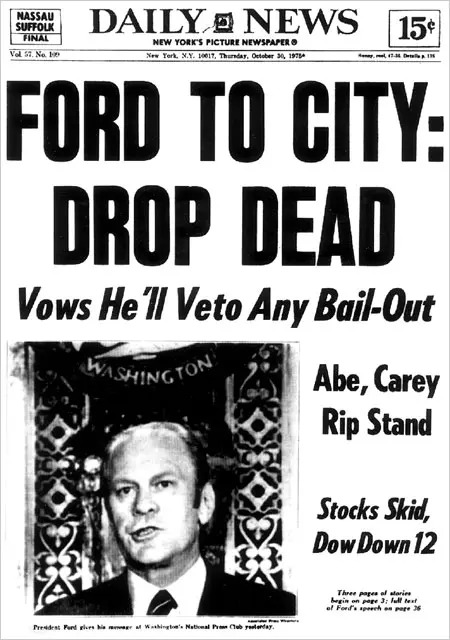
As I talked about with the list of NYC mayors, NYC had been borrowing money for a while. The underlying cause was that NYC's industrial economy had started shrinking in the 1950s, sapping the city's tax base and population. To try to cope with the social consequences of this economic decline, the city had been increasing spending on police, teachers, and welfare benefits. For a good while, the city had been able to paper things over by increasing taxes and various creative accounting measures, and had managed to keep things rolling over.
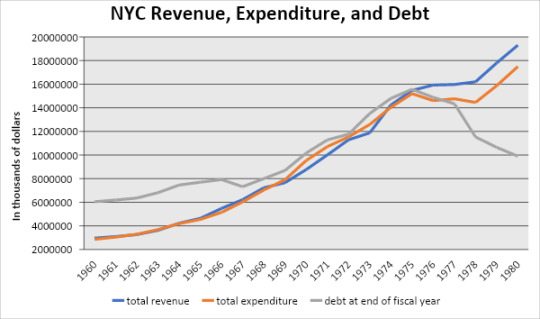
And then the 1973-1975 recession hit. All of the sudden, the city loses 38,000 jobs, unemployment rises, which means demand on social services increase, and all of the sudden that poor bastard Abe Beame is looking at a $1.5 billion annual hole in the budget that's ballooning NYC's debt.
But at the same time, another part of the story is that NYC's banks aren't doing too hot: as Joshua Freeman notes in Working-Class New York, the same NYC banks that had been encouraging city government to borrow more (because municipal bonds were a good profit source) had lent money very unwisely to developing nations and needed to cover their losses. So they started selling off their municipal debt holdings and started pushing the city to increase the interest rates they were offering.
However, they also asked for major policy changes. They wanted the city to fire public sector workers, they wanted the city to cut spending on social services and capital projects, and until the city agreed to make these changes, they wouldn't buy or underwrite city bonds. To me, the telling detail is that they started asking for more policy changes - raise the subway fares from ¢35, end free tuition at CUNY - that wouldn't affect the city's budget at all, since neither the MTA nor CUNY were city agencies. This wasn't just creditors wanting their debtor to improve their budget outlooks: this was a capital strike aimed at disciplining the unions, poor minorities, and the middle class into accepting a worse standard of living.
And so the city went to the Ford Administration for emergency aid, and Ford turned them down because he wanted to make NYC an example of what happened to liberal governments. Ford's Treasury Secretary said that the Federal government would only provide aid if the rescue package was "so punitive, the overall experience made so painful, that no city, no political subdivision would ever be tempted to go down the same road."
Ultimately, the city was forced to knuckle under. It eventually got a state bailout, but only by giving in to every conceivable demand that capital had made and giving them and the state government control over the city's taxes, bonds, and budget for decades. The result was that:
a quarter of the city's workforce lost their jobs;
the city's schools saw their teacher-student ratios shoot up and their wraparound services cut to shreds;
CUNY shrank by 62,000 students and became 50% whiter as black and brown students could no longer afford to attend;
the subway became more expensive, less reliable, and more dangerous;
public hospitals closed, leading to diverging health outcomes between rich and poor;
fire houses closed, leading to increasing response times that were the key factor behind the Bronx burning;
and on and on.
At the end of the decade, NYC had lost a million residents and would not recover fully until the turn of the millenium. But hey, at least the books were balanced!
34 notes
·
View notes
Note
hello, i was wondering if you knew anything (or if you could provide any sources) about georgian jews (gurjim)? if they assimilated in the georgian culture or converted to other religions?
The Georgian Jews’ diaspora is very ancient. The first Jews arrived in Georgia in the 5th century, when it was ruled by the Byzantine and Persian Empire, speaking a dialect known as Judeo-Georgian. From the Middle Ages through the first half of the nineteenth century a feudal system existed in Georgia. The Jews of Georgia belonged to the kamani, or serf class, under the Georgian elite, and were not forced to convert to Christianity. Moreover, Georgian kings used Jews in diplomatic service and often sent them to negotiations. For example in the 12th century Jewish head trader Zanjan Zorababeli brought a husband for Georgia’s first female king Tamar. The tradition of the relationship between Jews and other Georgians before the 19th century had no signs of anti-Semitism and Jews were an integral part of Georgian rural culture.


Over the centuries, the traditions and customs of this community also adopted many Georgian habits, most obviously those of the Georgian feasts and church holidays. The impact of Georgian culture is clearly seen in many areas, although equally evident is the similarity of the customs of the Georgian Jewish communities to those of the Jewish communities in Kurdistan, Persia and Turkey, which shows that, despite Georgia’s geopolitical isolation, the Jews always had close ties to their fellow believers living nearby.

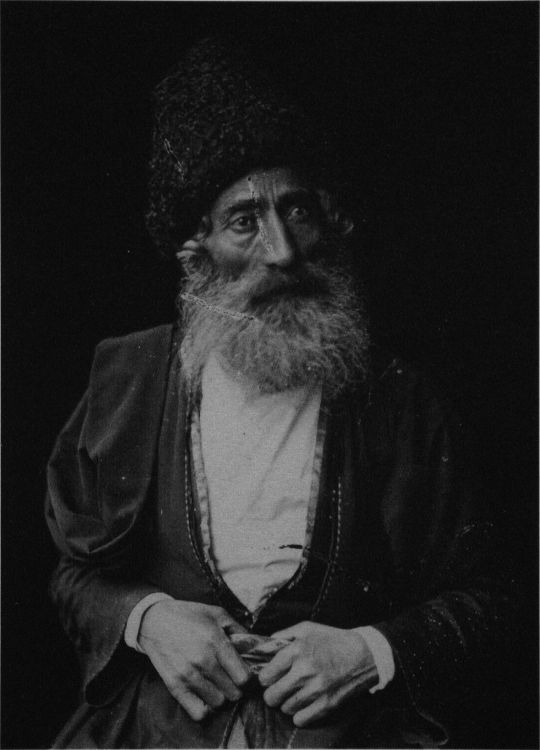
Until the Modern period, most Georgian Jews lived in villages and engaged in agriculture, especially vitaculture. After the abolition of serfdom by the Russian authorities (1864–1871), the Jews moved to towns, settling around the synagogues they founded there, thus initiating a process of establishing communities.
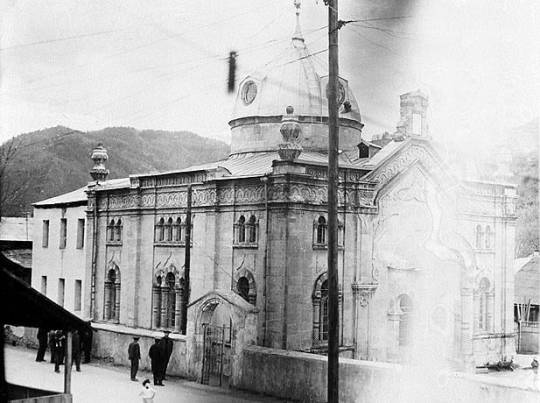

The Red Army invaded Georgia in February 1921, prompting a mass exodus from the region. Approximately 1,500–2,000 Jews left Georgia for Istanbul and Palestine. The Bolshevik government discriminated against the Jewish community, arresting and murdering most of its leaders, scattering Jews forcibly among farms and factories and inciting blood libels up to the 1960s. The only surviving Jewish institution was the History and Ethnography Museum, but it was soon closed down and its director arrested in the early 1950s, thus signifying the annihilation of Jewish culture in Georgia, which the Soviets had built up during the prewar years. But despite their attempts, most Georgian Jews managed to observe their traditions and preserve their identity.


The situation of the Jewish community of Georgia improved dramatically after the fall of the Soviet Union. In 1994, President Shevardnadze issued a decree to protect Jewish religious, cultural and historic monuments. The Georgian Orthodox Church and the Jewish community of Georgia signed a cooperation agreement of mutual respect and support.
Many Georgian Jews now live in Israel. In the United States, the principal Georgian Jewish synagogue is the Congregation of Georgian Jews in the Forest Hills section of Queens, New York City. Georgian Jews are also member of the Antwerp, Moscow, Berlin and Istanbul Jewish communities. Of the 250,000 Georgian Jews today, only around 3,000 live in Georgia proper.


86 notes
·
View notes
Text
“The market for farm products increased dramatically in urban areas because city dwellers had less ability or need to produce farm goods themselves. Before 1800, town and city dwellers often kept poultry and livestock in their backyards or on the town common, and they kept a well-stocked garden going as well. As cities grew, leading citizens worked to ban animals that had become health problems and nuisances. As land became more scarce and more expensive, the working class was forced into crowded tenement apartments.
Because of these changes, women in cities like Boston and New York were no longer making the farm products that their grandmothers had. But the new manufacturing technology had done little to transform life for most city women. For working-class women, the new cash economy made life harder and meaner. Then as now, women earned far less than men and were grouped into industries, such as textile, millinery (hat-making) and shoe-making, that were recognized as primarily ‘women’s work.’ A New York charity reported in 1817, ‘The great disproportion which exists between the price of labor of men and women is a matter of serious regret.’
…The problem was that conditions for working men were not much better than for women. Although they were paid more than women, most working-class men brought in just enough money to provide the basics. Any unforeseen emergency, such as a medical problem, could send a family to the poorhouse. If the man was too sick to work, or injured on the job, the family could starve. With little access to medical care, and with abysmal working conditions, death was an ever-present possibility. Such protections as unemployment insurance, Social Security, and Medicare were a century away. Given these pressures on the head breadwinner, many a man abandoned his wife and children for a fresh start in another town. His family, meanwhile, was left with few ways to survive.
…After 1800, elite society came to expect that ‘ladies’ would refrain from menial chores around the house. One domestic writer observed, ‘Women might work, but not ladies; or when the latter undertook it, they ceased to be such.’ There was thus an ever-widening gulf between mistress and servant during this period, and the domestic was made to understand this difference in rank. The growing distance between mistress and domestic led to numerous tensions between the two. Advice about the home in the newly popular magazines written for women increasingly described the role of the lady of the house as being a manager. She was to ensure that those beneath her performed their duties exactly as she prescribed them.
…Many working women chafed under such tight supervision. They felt that while domestic work paid well, the job just wasn’t worth it. Many women fell back on domestic work when all other options were unavailable. Some domestics even chose prostitution rather than submit to the orders of a mistress. Though opportunities for prostitution ranged from high-class hotel establishments to the lowest waterfront saloon side-rooms, all prostitutes were vulnerable to a wide range of sexual diseases. Those women plying their trade independently, or in the less genteel establishments, were especially vulnerable to violence by customers, proprietors, or criminals.
When working women chose prostitution over domestic service, they were rejecting in no uncertain terms the moral assumptions of middle-class America. It was a choice most mistresses explained away by pointing to the ‘natural’ moral laxness of the poor. Certainly, upper-class women were not ready to admit that servants were so scarce because working conditions were so trying. Domestics became even more scarce in the 1820s, after the development of power mills in New England. These mills provided American women with their first opportunity at respectable, relatively safe work at reasonable wages.
…Mill workers believed they were in a partnership with the owner--subordinate partners, to be sure, but nonetheless members of the company who were crucial to the success of the business. When owners responded to increased competition and poor business conditions with sharp reductions in wages and increases in the rents they charged in their boardinghouses, many women workers were outraged, As conditions continued to decline during the 1840s, mill owners began to turn to recent immigrant women, such as the Irish, who would accept lower pay and more work.
…Slave women, of course, had even less choice of jobs and working satisfaction. Their master or mistress usually determined which tasks they would perform. Women were sent to the fields just as men were, and they were expected to do their share of the work. Slaveholders cared little about preserving a ‘women’s sphere’ for field workers. …A small percentage of the slave work force, about 5 to 10 percent, worked in the ‘Big House,’ as the plantation manor was called. Most of these workers were women, who labored as cooks or maids.
…White southern plantation women, while certainly benefitting from slave labor, also were responsible for much of the plantation’s labor. Whereas the master hired an overseer to do much of the dirty work, the mistress was in effect the overseer of the Big House, including the tending of livestock and poultry and the production of food and clothing. Additionally, the mistress took on a number of tasks for which she did not trust her slaves. Even the most privileged mistress had to take on fairly strenuous tasks from time to time, such as processing the various by-products of slaughtered animals.”
- Michael Goldberg, “Working in the Home, Working in the Fields, Working for Wages.” in Breaking New Ground: American Women, 1800-1848
7 notes
·
View notes
Text
1899: Season 1: Reverse-engineering the sim…
Beware: Season 1 spoilers! If you have not watched all eight episodes of 1899 season 1, get thee to your streaming device and watch! Then come back for some boring rambling and probably way too many occurrences of the words "sim" and "simulation". =)
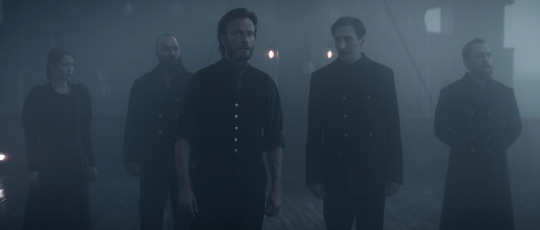
In the 1899 season 1 finale, we see a "survival ship", the Prometheus, in the year 2099. If the destination coordinates provided define a point in the sky on Earth, then it the ship is built for interstellar travel, as the point does not correspond to a body in our solar system.
When Maura wakes in 2099, she sees 16 total sarcophagi, fourteen with familiar faces from the simulation, her own, and one more empty one. She doesn't seem to be restrained in any way when she disengages from the sim and steps out of her coffin. Based on this and some familiar science/science fiction conventions, I am going to assume that all the people aboard the 2099 Prometheus voluntarily went into some form of induced hibernation to retard the aging process while on a possibly lifetimes-long journey to a planet orbiting another star. At the same time, to maintain their mental health while their body slows its functions, their consciousnesses enter a shared simulation.
Based on what we see of the travelers and their experiences aboard the 1899 Kerberos and Prometheus, I'm going to try to piece together how the simulation is designed to run, before any modification or corruption of its code.

WHY A *SHARED* SIMULATION?
A shared simulation, as opposed to 1423 + 550 independent and perhaps customized simulations. I do not have a great answer that clicks into place for this. Some possibilities…
1. A single shared simulation is less taxing to maintain than almost 2,000 individual ones. I doubt this, but depending on the scope and allowances of the simulation/s, the nature of the simmersion tech, and the limitations computing power, who can say?
2. The social interaction between living minds is vital to the mental health of the travelers.
Honestly, it may very well be that each 2099 sleeper is the star of their own simulation, but for the purposes of this ramble, I'm assuming they are all in a single shared sim.

WHY SET THE SIM ON A CRUISE IN 1899?
Using a cruise ship as a setting means the sim only needs to manage a closed and finite environment. The ship's simulated crossing is an elegant substitution for the actual voyage of the travelers, and is a perfect pretense for having almost 2,000 strangers share the same space for a time. Simulating the technology of 1899 requires less power and processing than that of a more advanced era and also restricts travelers' exposure to and ability to communicate with and travel to the world beyond the ship.
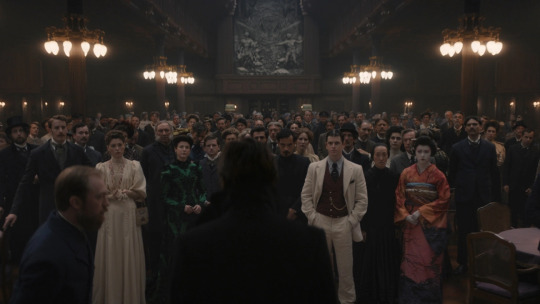
WHAT IS THE BASIC SIM EXPERIENCE DESIGNED TO BE?
The simulation is of a transatlantic cruise set in 1899, from England to America. By design, it runs for eight days and does not include the departure from London or the arrival in New York (unnecessary complexity/processing of cities, people, shorelines, weather, etc). It begins when the ship is already at sea, perhaps with the passengers and crew waking on the second day of their journey, and ends with them going to sleep on the second to last day, still at sea. Every traveler enters the simulation as a first class passenger. Every crew member enters as an officer. All service and labor roles are assigned to NPCs (unless a traveler has specifically requested such a role — why not, right?).

WHY A LOOP OF LIMITED TIME?
The simulated voyage of the 1899 Prometheus covers eight days. That means that the most time a traveler can experience, the greatest duration of new memories they can create during a single loop run, is eight days. At the end of those eight days, the ship is archived and a new one is launched with rebooted passengers and crew who have no memory of the previous run. (No one aboard the Kerberos except Daniel, Elliot, and First Mate have any awareness of previous simulation runs.) This prevents the minds of the 2099 travelers from living every minute of their journey between the stars. I hypothesize that in the show's world, the creation of memories that amount to a lifetime or more (the duration of the 2099 space voyage) of experiences would result in damage to or malfunction of a person's mind.
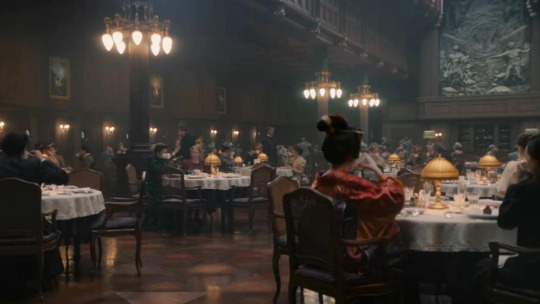
THE TRAVELERS CANNOT KNOW THEY'RE EXPERIENCING A SIMULATION…
Awareness that the world of the simulation is virtual invites irresponsible behavior, ranging from abuse of the environment to violence against other travelers to self harm. To avoid this, the travelers' 2099 knowledge and memories are blocked/suppressed and replaced with backstories and memories that fit the 1899 setting and as much as possible, reflect their own personal characters and histories.
These backstories are adapted from their real lives to help preserve within the simulation their already developed personalities and natures, as well as established relationships with other travelers if they have them. Their real life data might be collected via interview and/or memory scan. Adapted 1899 memories are conjured via AI and implanted via a kind of technological hypnosis and suggestion. Within the simulation, at least one backstory "cut scene" is built for each traveler to experience, providing scripted dreamlike experiences and a sensory touchstone from which their minds can extrapolate the details of the rest of their implanted memories.
I think that the nature of the induced hibernation and simmersion technology put the mind into something similar to a natural dream state, and minds in the simulation cannot truly dream within the pseudo-dream of the sim, so when travelers do sleep in the sim, the scripted backstory cut scene is played for them in the worlds connected to their cabins by the hatches under their beds.

TRAVELERS ARE GIVEN A CHOICE…
Before being immersed in the simulation, each traveler is given the option to remove or preserve certain traumatic life-defining events. Removal is allowed if the predicted effect on the traveler's experience is judged to promote better mental health and decrease stress, anxiety, conflict, and/or depression in the simulation experience. If a traveler has experienced a traumatic loss that pains or haunts them at the time they enter the simulation, imagine the impact on their mental state if they must live with it in an almost arrested state in loops for decades, or even centuries, while in hibernation?

HOW IS THE SIMULATION DESIGNED TO CHANGE…?
One simulation loop consists of eight days aboard the Prometheus at sea, traveling from London to New York. The ship travels with many empty cabins (perhaps all first class cabins are full, but second and third class are empty) and carries very little cargo. That amounts to a lot of unused and uninhabited space. It is in this space that the simulation constructs the backstory worlds of each traveler, within the bowels of the ship itself.
Travelers spend their time doing whatever they wish, enjoying the sea air, dining, relaxing, and socializing. The voyage is meant to be a pleasant experience and the AI running the simulation monitors brain activity to gauge whether that is true for each and every traveler. If it discovers that a traveler has had a suboptimal loop, it makes adjustments to the traveler's memory and environment to improve their experience in the next loop. Over time, it's possible that this iterative optimization process can result in radical changes to some travelers' backstories and even their relationships with other travelers.

SO, WHAT HAPPENED…?
If the sim is designed to be a pleasant journey, how did it transmogrify into what we witness in the eight episodes of season 1? I have several theories, and almost all of them build on the idea of an original benign purpose and design of the 1899 simulation that is ultimately modified and/or corrupted. Yes, the 2099 that Maura wakes up to may be a simulated world as well, but the above notions of the 1899 simulation still work. These 2099 travelers voluntarily entered it.
Will try to put some of my theories into posts soon, but wanted to get this Out There as a starting point.
Wake up 🜃
Keep on keepin' on~
#1899#theory#spoilers#season 1#simulation#prometheus#2099#Maura#Maura Franklin#netflix#1899netflix#1899 theories#1899 spoilers
57 notes
·
View notes
Text
Personal Training NYC: Elevate Your Fitness Journey
In the bustling metropolis of New York City, where time is a premium and the pursuit of wellness is ever-growing, personal training has emerged as a pivotal solution for achieving fitness goals. With a plethora of options available, finding the right personal trainer in NYC can be a game-changer for those seeking tailored fitness plans and expert guidance.
Personalized Fitness Plans
One of the primary advantages of Personal training NYC is the customization of fitness plans. Personal trainers in the city offer personalized programs that cater to individual goals, whether it’s weight loss, muscle gain, improving athletic performance, or enhancing overall health. These customized plans are based on a thorough assessment of each client’s fitness level, medical history, and specific objectives.
Expert Guidance and Motivation
New York City’s personal trainers are renowned for their expertise and diverse specializations. From certified strength and conditioning coaches to yoga instructors and rehabilitation specialists, NYC boasts a wide range of professionals who can provide expert guidance. These trainers not only offer instruction but also serve as a source of motivation. Their support helps clients stay committed to their fitness routines, especially in a city where distractions are abundant.
Flexible Training Options
Flexibility is another key benefit of personal training in NYC. With the city’s fast-paced lifestyle, personal trainers often offer various training options, including one-on-one sessions, small group training, and virtual workouts. This flexibility ensures that clients can fit their workouts into their busy schedules, whether they prefer training at home, in a gym, or even outdoors.
State-of-the-Art Facilities
Many NY Personal Trainers operate out of state-of-the-art fitness facilities equipped with the latest technology and equipment. These facilities offer a motivating environment where clients can engage in a wide range of exercises, from high-intensity interval training (HIIT) to functional fitness. The availability of advanced equipment and amenities enhances the overall training experience and helps clients achieve their fitness goals more efficiently.
Holistic Approach to Wellness
Personal trainers in NYC often adopt a holistic approach to wellness, addressing not just physical fitness but also aspects like nutrition, stress management, and overall lifestyle. Many trainers offer additional services such as dietary advice, mental wellness coaching, and recovery strategies. This comprehensive approach ensures that clients receive well-rounded support, promoting long-term health and well-being.
Community and Support
Joining a personal training program in NYC can also foster a sense of community and support. Many trainers create an inclusive environment where clients can connect with others who share similar fitness goals. This sense of community can be incredibly motivating and make the journey towards better health more enjoyable.
How to Choose the Right Trainer
Selecting the right personal trainer in NYC involves considering several factors. Potential clients should look for trainers with relevant certifications, experience, and a track record of success. It’s also important to find a trainer whose training style and personality align with one’s own preferences. Many trainers offer complimentary consultations or trial sessions, allowing prospective clients to assess whether a particular trainer is the right fit.
2 notes
·
View notes
Text
Over the past few decades, much of the media and policy debate around labor issues have focused on low wages. Labor issues related to work schedules have received far less attention. In fact, 17% of the U.S. labor force works on unpredictable or unstable schedules with short advance notice (Golden 2015). They are disproportionately concentrated in lower paid occupations in the retail and service sectors. According to a national survey on retail jobs, 87% of retail workers report hour variations in the past month with the average variation equivalent to 48% of their usual work hours, 50% report a week or less advance notice, and 44% say that their employer decides their work hours without their input (Lambert et al. 2014). The prevalence and the rapid growth of unpredictable and unstable schedules has resulted in many social issues, including difficulties arranging childcare and threats to households’ economic security (Henly and Lambert 2014).
The economic trade-off of predictable schedules and the ongoing policy debate
Unpredictable and unstable schedules are so prevalent in service businesses, because labor accounts for a significant part of the operating cost of service businesses, especially in retail, food, and hospitality services. Having just enough (but not too many) workers on hand is essential to balancing customer service and profitability. As firms try to strike that balance, many—especially those in the service and retail sectors—practice “just-in-time” (JIT) scheduling, which entails managers scheduling their employees “on the fly” based on immediate workplace needs. By using just-in-time scheduling, service firms mitigate the uncertainty they often face in customer demand and employee no-shows. This helps them reduce the labor hours needed and thus labor cost (Terwiesch and Cachon 2012). While JIT scheduling can be effective in reducing firms’ labor costs, it also leads to highly unpredictable and fluctuating schedules for workers, which negatively impact their quality of life, especially among low-income workers. In short, firms have been using JIT scheduling to transfer business risks to their employees.
Recent local and state policies aim to reduce this practice. Since 2014, one state (Oregon) and multiple cities (e.g., Chicago, Los Angeles, New York, Philadelphia, San Francisco, Seattle, and Emeryville, California), have passed various forms of “predictive scheduling laws,” sometimes also referred to as “fair workweek laws.” In general, they require employers to post work schedules in advance and provide additional pay for any last-minute schedule changes. Some versions of such laws, (e.g., the ones in New York City, Seattle and Emeryville, California), also require employers to offer part-time workers the chance to increase their hours before adding new staff (Wolfe et al 2018).
Service firms, especially those in the retail, food, and hospitability industries, argue that such requirements remove the staffing flexibility they need to operate their businesses effectively, which may lead to bankruptcy and eventually loss of jobs. Indeed, such policies have received strong resistance from employers in the service and retail sectors and are still pending or have failed to pass in many cities and states across the U.S. States including Arkansas, Georgia, Iowa, and Tennessee even prohibit jurisdictions within the states from passing predictable scheduling laws. Predictable scheduling laws also differ in the level of advance notice they require firms to inform their workers about their schedules. For example, the city of New York requires 72 hours advance notice (for its retail workers) and the state of Oregon initially required one-week advance notice but later increased to 14 days, while most other cities require 14 days advance notice.
Is JIT scheduling really that beneficial to service firms?
In light of this debate, Masoud Kamalahmadi (University of Miami), Yong-Pin Zhou (University of Washington) and I conducted a study to answer whether and to what extent the flexibility created through just-in-time scheduling benefits the firm and how policy makers can better design predictable scheduling laws (Kamalahmadi et al. 2021). On the one hand, it is clear that just-in-time scheduling helps firms reduce their labor cost as explained earlier. On the other hand, the potential impact of just-in-time scheduling on the workers’ productivity, and thus the firm’s revenue, was not well understood. It was the goal of our study to seek objective evidence that can shed light on this important issue.
10 notes
·
View notes
Text
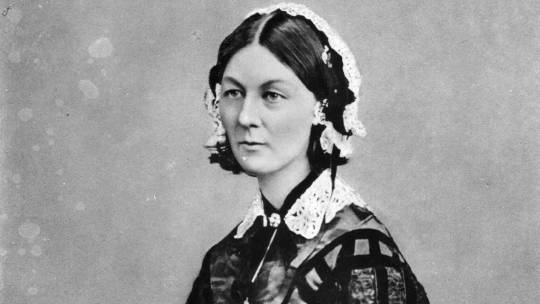
Florence Nightingale, first practicing nurse epidemiologist. Developed the first organized program for training nurses, the Nightingale Training School for Nurses (St. Thomas' Hospital, London). Established the first health-maintenance-and-restoration-based nursing philosophy. Known as the "lady with the lamp" during the Crimean War (1853) where she volunteered, traveling the battlefield hospitals nightly to treat the wounded.

Clara Barton, founder of the American Red Cross (1881). She risked her life provided self-taught nursing aid to wounded soldiers on the battlefields during The Civil War (1860-1965), and became referred to as the "Angel of the Battlefield". One of the first women to work for the federal government, she made the Office of Missing Soldiers to aid in the reunion of more than 20,000 soldiers with their families. While providing aid during the Franco-Prussian War (1869), the Red Cross movement was first brought to her attention, inspiring her to bring the movement to America.
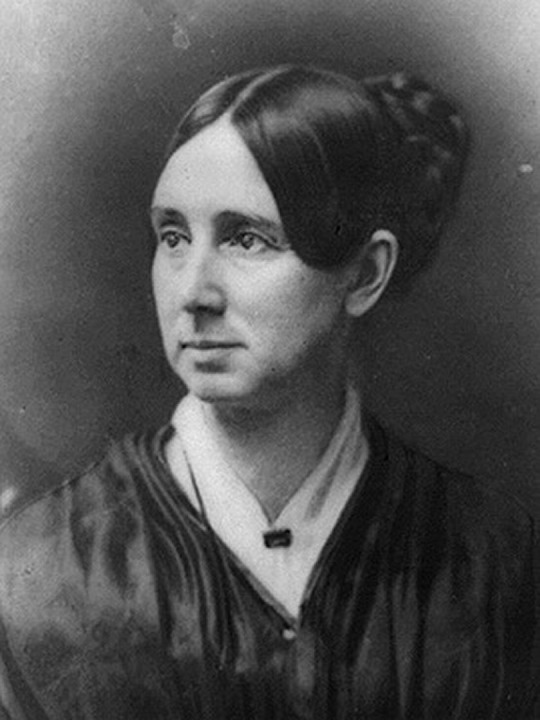
Dorothea Lynde Dix, an advocate of indigenous people and the mentally ill. She visited multiple mental institution, reporting her findings and advocated for better managed institutions, eventually establishing asylums of her own. During The Civil War (1860-1865), she aided the Union army by recruiting more than 3,000 nurses and was designated as the Superintendent of Army Nurses. She was known and respected for providing aid to the wounded soldiers from both Confederate and Union sides.

Mary Ann Ball, aka Mother Bickerdyke. She was a hospital administrator for the Union soldiers during The Civil War (1860-1865), regulating supplies and provision for the troops. Referred to as one of the best "generals" during the war for her efforts and organizations of military hospitals, following the war she remained an advocate for veterans - becoming an attorney for those who faced legal issues. 300 hospitals were built to aid the wounded over 19 different battlefields from her involvement.

Harriet Tubman, provided safe passage for slaves during the Underground Railroad movement. Known as the "Moses" of her people, her actions resulted in more than 300 slaves being lead to freedom. She provided nursing aide to the Union forces during The Civil War (1862-1865). Following the war, she played in active role in causes including the Womens Suffrage, and created the "Harriet Tubman Home for Indigent Aged Negroes" where orphans and the elderly could be taken in and care for.
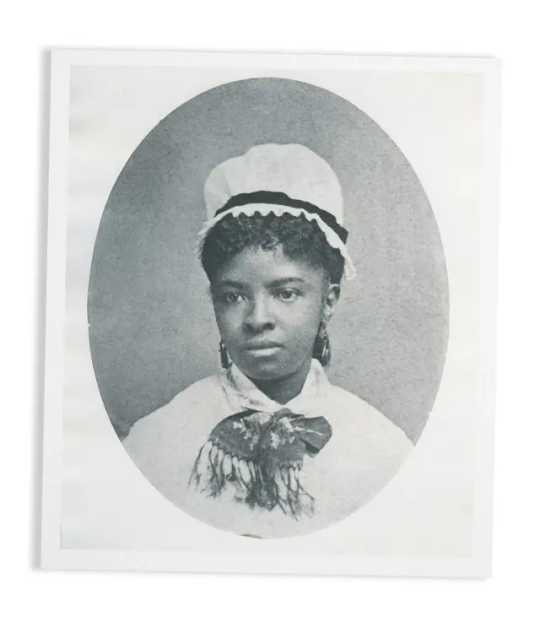
Mary Mahoney, brought awareness to the cultural and racial diversity in nursing, emphasizing respect and the inclusion of all in the profession. The first African-American to receive an official education for the nursing profession (New England Hospital for Women and Children, Boston - 1874). She became the first African-American member of what is now referred to as the American Nurses Association, and helped start up the National Association for Colored Graduate Nurses in 1908.

Isabel Hampton Robb, a large influence in the advancement of the nursing social status in society. She influenced the system of nursing education by implementing a grading policy in the program to improve the quality of the students graduating from the program. She authored the comprehensive and foundational text, Nursing: Its Principles and Practice (1893), and helped to standardize the nursing education all around. She served as president of both the National League for Nursing Education and what is now referred to as the American Nurses Association.

Lillian Wald, opened the Henry Street Settlement (1893) with her fellow nurse graduate, Mary Maud Brewster. Addressed the health needs of poor immigrant families residing in tenements of New York City's Lower East Side. Coined the term "public health nurse", she fought for public health care, women's rights, and children's rights. Her and Mary Brewster started the Visiting Nursing Service of New York. During her work at the Henry Street Settlement, she established one of the earlier playgrounds and aided in paying salary to the first Public School Nurses in NYC. She had a hand in starting up the United States Children's Bureau, the National Child Labor Committee, and the National Women's Trade Union League.

Mary Adelaide Nuting, known for becoming the first nursing professor in 1906 (Columbia Teachers College), and assisted in getting nursing education in Universities across the states. She attended the first nursing training following Florence Nightingale's inflence (John Hopkins Hospital Training School - 1889). Throughout her advancement in the nursing profession working at the school, she assisted in advancing the program - brought in scholarships and on-the-field experience; her work influencing other Universities create and better their own nursing programs. Founder of the American Journal of Nursing (1900), she also became the first registered nurse in the state of Maryland. Several of her authored and coauthored books are still implemented today in nursing programs throughout the nation.
#Historical Influences#Historical Nurses#Nurses in History#Nursing History#Women's History#Black History#Black Women's History#Florence Nightingale#Nursing Philosophy#Clara Barton#American Red Cross#The Civil War#Dorothea Lynde Dix#Mary Ann Ball#Mother Bickerdyke#Harriet Tubman#Lady with the Lamp#Angel of the battlefield#Mary Mahoney#Underground Railroad#Isabel Hampton Robb#American Nurses Association#Lillian Wald#Public Health Nurse#Mary Adelaide Nuting#Mary Maud Brewster#Nursing#Nurses#Nurse#public school nurse
5 notes
·
View notes
Text
Although many surprises undoubtedly lurk down river, it is already clear that the advent of ‘catastrophic terrorism’ in tandem with what may likely be the worst recession since 1938 will produce major mutations in the American city. There is little doubt, for instance, that bin Laden et al have put a silver stake in the heart of the ‘downtown revival’ in New York and elsewhere. The traditional central city where buildings and land values soar toward the sky is not yet dead, but the pulse is weakening. The current globalization of fear will accelerate the high-tech dispersal of centralized organizations, including banks, securities firms, government offices, and telecommunications centres, into regional multi-site networks. Terror, in effect, has become the business partner of technology providers like Sun Microsystems and Cisco Systems, who have long argued that distributed processing (sprawling PC networks) mandates a ‘distributed workplace’. In this spatial model (of which the Al-Qaeda network might be an exemplar), satellite offices, telecommuting and, if the need be, comfortable bunkers will replace most of the functions of that obsolete behemoth, the skyscraper. Very tall buildings have long been fundamentally uneconomical; indeed the absurdly overbuilt World Trade Centre—a classic Rockefeller boondoggle—was massively subsidized by public-sector tenants.footnote23 (Will the hijacked airliners someday be seen as having played the same role in the extinction of skyscrapers as the Chixulub asteroid in the demise of dinosaurs?)
[...]
Despite massive plans for ‘hardening’ and ‘terror-proofing’ downtown public spaces and monumental buildings, however, most white-collar workers and managers will prefer to consume enhanced security closer to their suburban homes.footnote24 Physical security retrofits—the reinforcement of building structures, vapour-and-trace detection systems, bollards and traffic barricades, bomb mitigation containers, smart doors, metal detectors, bomb-proof trash cans, biometric surveillance portals, reduced surface and underground parking, and so on—will impose huge and unavoidable expenses for cities trying to shore up their downtown economies, but they are unlikely to stem the new exodus of jobs and tax resources. Massive public-sector subsidies to developers and corporate tenants likewise may slow but probably won’t reverse the trend toward deconcentration. In addition, as self-advertised ‘world cities’ hunker down for the long siege, urban economists and fiscal analysts must wrestle with the new demon of ‘de-globalization’: the portion of global service production and international tourism that may be lost forever.
I sometimes think back on the “fortress suburbia“ vision of ~2000 where locked-up suburban subdivisions would be opposite total urban blight that seemed like the inevitable future, instead we got “gentrification” as the major issue of ~2010. Seemed like that might happen with covid too, although that’s still up in the air it seems like I’m not gonna get lucky enough to have my area blighted and get a goddamn rent reduction.
35 notes
·
View notes
Text
Hydra Prized Creation
➥ summary: Hydra created a mastermind unlike none other with intellects only the greatest individuals could possess they combined that with their new advanced version of the super solider serum, and thus a ghost was born.
➥ chapter 7: A New Path Unveiled

After carefully weighing the risks and considering her priorities, (Y/N) decided to take a different approach to her new life in New York City. Rather than seeking the thrills and dangers associated with the heroes who protected the city, she chose a more grounded path—an opportunity for stability and growth. With a determined spirit, (Y/N) set her sights on securing a job at a small restaurant nearby her home.
Before embarking on her new endeavor, (Y/N) visited a local library, eager to arm herself with knowledge about the art of waitressing and providing excellent customer service. She delved into books that offered insights into the intricacies of the service industry, studying the etiquette, communication skills, and techniques that would help her excel in her new role. The library became her sanctuary once again, a place where she could gather information and empower herself for the journey ahead.
Armed with newfound knowledge, (Y/N) approached the restaurant with confidence. Its quaint exterior and cozy atmosphere beckoned to her, offering a sense of belonging that she had longed for. She applied for a position as a waitress, her eagerness and determination shining through her carefully crafted cover story. The manager, impressed by her passion and willingness to learn, offered her the job on the spot.
The first day at work filled (Y/N) with a mix of excitement and nervousness. The aroma of freshly brewed coffee and the sounds of clinking cutlery surrounded her as she donned her uniform and stepped onto the bustling floor. The restaurant, a hub of activity, introduced her to a diverse array of customers, each with their own unique stories and needs.
Drawing upon her diligent research, (Y/N) embraced her role as a waitress with grace and professionalism. She learned to navigate the fast-paced environment, ensuring that orders were taken accurately and delivered promptly. Her attention to detail and willingness to go the extra mile endeared her to both her colleagues and the customers she served.
In her spare moments, (Y/N) would discreetly observe her coworkers, learning from their expertise and adapting their tried-and-true techniques. She observed how they balanced efficiency with warmth, how they anticipated the needs of their customers, and how they handled challenging situations with poise. Their camaraderie and shared purpose created a sense of belonging—a feeling that (Y/N) had longed for since her escape from HYDRA.
As days turned into weeks, (Y/N) developed meaningful relationships with her coworkers. The small restaurant became her second family, a place where she felt supported and valued. Through their stories and experiences, she learned about the beauty of human connection, the power of shared laughter, and the strength found in community.
While (Y/N) found solace in her work and the bonds she formed, she remained ever vigilant. She understood that danger could lurk in unexpected places, and her past could still catch up with her. HYDRA's watchful eye could penetrate even the most seemingly benign environments, and she had to remain vigilant, ready to defend herself and protect those around her.
As time passed, (Y/N) continued her pursuit of justice outside of her role as a waitress. She discreetly sought out information, networked with like-minded individuals, and channeled her experiences into a greater purpose. Her work at the restaurant provided stability and a means of sustenance, but her mission to expose HYDRA's operations remained at the forefront of her mind.
Her dedication to her job did not go unnoticed. (Y/N)'s exemplary service and commitment to customer satisfaction led to promotions and increased responsibilities within the restaurant. Her coworkers and superiors praised her work ethic and innate ability to make customers feel welcome. It was a testament to her determination to excel and her unwavering dedication to any task she undertook.
As (Y/N) reflected on her journey from a victim of HYDRA's experiments to a valued member of the small restaurant's team, she realized that her path had taken an unexpected turn. The restaurant had become a haven, not only providing her with stability but also igniting a spark of purpose and self-discovery. Her experiences as a waitress had taught her resilience, adaptability, and the power of human connection.
While the heroes of New York City continued to fight their battles against evil, (Y/N) had found her own battlefield—the realm of everyday life, where acts of kindness, dedication, and empathy could make a difference. In her role as a waitress, she touched the lives of strangers, spreading warmth and creating moments of joy amidst the chaos of the city.
With each passing day, (Y/N) embraced her role with renewed vigor, knowing that she was making a positive impact, one table at a time. She understood that true heroism wasn't always about superhuman abilities or grand battles; it could be found in the simplest acts of kindness and the commitment to serving others.
#Hydra Prized Creation series#Hydra Prized Creation#the avengers x reader#avengers imagine#avengers x reader#the avengers#the avengers x hydra reader#avengers imagines#x reader#x reader series#Hydra Prized Creation masterlist
13 notes
·
View notes
Text

City Council, Homeless Services Providers and Advocates Call on Mayor to Sign All CityFHEPS Bills, Passed by Veto-Proof Majority, into Law
Bills provide solutions to record homelessness and worsening eviction crisis
In response to Mayor Adams’ executive order suspending the rule that requires individuals to stay in a homeless shelter for 90 consecutive days before qualifying for a CityFHEPS housing voucher, the New York City Council, homeless services providers and advocates called on the Mayor to sign all of the recently-passed Council bills into law. The four bills were passed by the Council on May 25 with votes of 41 to 7, far more than a veto-proof majority.
First heard in January, the bills were overwhelmingly approved by the Council after nearly one year of inaction by the Administration to eliminate the 90-day rule, despite first pledging to end it in June 2022. As the city continued to welcome tens of thousands of people seeking asylum in the U.S. throughout the past year, the Council continued to call for the Administration to eliminate the rule in statements, hearings, and reports, as a solution to better assist New Yorkers in transitioning out of the shelter system to permanent housing.
According to data for the first four months of Fiscal Year 2023 in the most recent Preliminary Mayor’s Management Report, the average length of stay in shelter was 802 days for adult families, 485 days for families with children, and 441 days for single adults. The Mayor’s Housing Blueprint estimates that it cost the city nearly $8,773 per month to house a family of two in the shelter system in 2022. A CityFHEPS voucher for the same family would cost a maximum of $2,387, and likely less, resulting in a lower total annual expense.
At a time of record homelessness, the Administration has also left thousands of apartments vacant. It has failed to place homeless New Yorkers into over 2,000 vacant supportive housing apartments, while cutting funds from and understaffing the agencies responsible for making the placements. It has also cut funding from NYCHA to help fill vacant apartments, when over 6,500 remain empty and unavailable for tenants. Meanwhile, the Mayor’s administration has failed to intervene as the number of evictions has skyrocketed, surpassing 100,000 cases in the courts.
“Passing legislation to reform city policies that have blocked New Yorkers’ access to CityFHEPS housing vouchers was a critical and long overdue step to help people move out of shelters, find and maintain stable housing, and reduce homelessness,” said Speaker Adrienne Adams. “The 90-day rule is just one of several counterproductive barriers that the Administration failed to take action to eliminate, leaving too many New Yorkers stuck in shelters far longer than necessary. The efforts to transition people from homeless shelters to permanent housing have been inadequate, straining the City’s shelter capacity under additional pressures. While we welcome the Administration finally seeming to drop its opposition to end the 90-day rule, the Council’s legislation importantly codifies the change and provides a more comprehensive approach to remove other obstacles to housing vouchers that can help protect New Yorkers. The only reliable path forward to truly confront the city’s eviction and homelessness crises is for the Mayor to sign the entire package of legislation.”
“The policies and systems we have in place right now to address homelessness within our city do not work,” said Deputy Speaker Diana Ayala. “Rather than reforming the system to prevent families from becoming homeless, our current policy is to force New Yorkers into the shelter system before we agree to help them. It doesn’t make sense and the City Council acknowledged that. We collectively took a stand and passed a package of bills aimed at addressing the issue. I ask the Mayor to join the City Council in putting the needs of New Yorkers first.”
“We are at a critical juncture in our city’s housing and homelessness crisis, with record levels of individuals and families affected, especially as we welcome new New Yorkers,” said Council Member Pierina Sanchez. “My district knows the heartbreaking consequences firsthand. One in ten households of Bronx community district 5 faced eviction last year. This has meant more children forced to commute over 90 minutes from shelters in Queens or Brooklyn to the Bronx, severing vital social bonds and support networks that are crucial for their development. As we welcome new New Yorkers, we need solutions that ease our over-burdened systems and stabilize our communities. This is why our Council passed Int 893 and Int 894, which position CityFHEPS as an upstream eviction prevention tool. Int. 893 would end the requirement that a family become homeless before they are eligible for a voucher, keeping families in their homes and out of shelter. Int. 894 will ease work and income requirements, again, preventing folks from entering shelter in the first place. These bills are fiscally prudent. Per the Mayor’s Housing Blueprint, it cost the city nearly $8,773 per month to house a family of two in the shelter system in 2022. A CityFHEPS voucher for the same family would cost a maximum of $2,387, and probably less, resulting in a lower total annual expense. Signing these bills would represent commitment to fighting for housing and against homelessness. I urge the Mayor to sign these bills into law.”
“A comfortable, reliable home is the essential pillar of a dignified life, and a key foundation of true public safety, not to mention public health,” said Council Member Tiffany Cabán. “The bills recently passed by Council, taken together, constitute an important step toward a city where the purpose of the housing system is guaranteeing all New Yorkers housing, not maximizing profits for corporate landlords and billionaire developers. In the interest of safety, health, and dignity, the Mayor must move swiftly to sign this critical package of bills into law.”
The bills, which include elimination of the rule that requires individuals to stay in a homeless shelter for 90 consecutive days before qualifying for a CityFHEPS housing voucher, also help ensure vouchers can prevent evictions, do not undermine economic advancement, and are adequately valued to include utility costs.
Introduction 878-A, sponsored by Deputy Speaker Diana Ayala, would remove shelter stay as a precondition to CityFHEPS eligibility. This would remove eligibility barriers, reduce lengths of stay in the shelter system and prevent new shelter entrants. [1]
Introduction 893-A, sponsored by Council Member Pierina Sanchez, would remove certain eligibility restrictions for CityFHEPS to allow applicants at risk of eviction or experiencing homelessness access to vouchers. [2]
Introduction 894-A, sponsored by Council Member Pierina Sanchez, would change the eligibility for a CityFHEPS voucher from 200 percent of the federal poverty level to 50 percent of the area median income and remove work and source of income requirements that make it difficult for individuals to pursue employment and housing concurrently. [3]
Introduction 229-A, sponsored by Council Member Tiffany Cabán, would prohibit the Department of Social Services from deducting a utility allowance from the maximum amount of a CityFHEPS voucher, except in limited circumstances. [4]
Alongside the CityFHEPS bills, the Council has pushed for increased funding for the city’s affordable housing capital budget, right-to-counsel program, and agencies responsible for homelessness and housing, like the Department of Homeless Services, Human Resources Administration, Department of Housing Preservation and Development, and New York City Housing Authority.
“Low-income and immigrant New Yorkers are struggling to deal with the increasingly drastic affordability and shelter crises – but with the bold action taken by the City Council, there is a path forward to permanent housing and self-sufficiency,” said Murad Awawdeh, Executive Director of New York Immigration Coalition. “Mayor Adams is rightfully ending the 90-day rule for the CityFHEPS voucher program, but this step is not enough to address the magnitude of our current situation. If we continue putting forward half-measures and band-aid fixes, we are destined to perpetuate the longstanding problems of our City’s overburdened shelter system. Mayor Adams must sign the entire City Council package, to expand eligibility to vouchers and help New Yorkers skip entering the shelter system altogether. With these cost-effective policies in place, New York families will be able to move out of the shelters and streets, and into permanent housing where they can begin to build the lives they deserve.”
“We must remain focused on implementing solutions that prevent homelessness, rapidly rehouse homeless New Yorkers, and avoid petty distractions in the form of a Mayoral veto,” said Celina Trowell, Homelessness Union Organizer at VOCAL-NY. “If we had a real partner at Gracie Mansion, the administration would have ended the abhorrent 90-day rule unilaterally instead of the Council having to force the Mayor’s hand by passing Int. 878-A. We hope this executive action honors the full scope of Int. 878-A and strongly urge the Mayor to sign the CityFHEPS reforms passed by the Council, including Int. 229-A, Int. 894-A and Int. 893-A.”
“Temporary suspension of a bad policy is fine, but permanent legislation to end it is much better,” said Jose Lopez, Co-Executive Director of Make the Road New York. “We urge the Mayor to immediately sign the Council’s strong CityFHEPS package, which includes several measures that will help get New Yorkers out of the streets and shelter system, and into permanent housing.”
“We welcome this decision by the Adams Administration to suspend the arbitrary and punitive ‘90-day rule,’ an overhaul we have long advocated for,” said Judith Goldiner, attorney-in-charge of the Civil Law Reform Unit at The Legal Aid Society. “However, this should not supplant enacting the package of comprehensive CityFHEPS reforms recently passed by the Council that would improve housing stability for the thousands of New Yorkers who are experiencing or on the verge of homelessness. Following Albany’s failure to advance any significant housing policy this session to address the state’s unprecedented housing crisis, it’s now incumbent on Mayor Adams to sign these crucial bills into law immediately.”
“While we applaud the Mayor’s decision to take quick executive action to eliminate the 90-day rule, this reform alone is not enough, said Catherine Trapani, Executive Director of Homeless Services United. “Our City is facing an enormous crisis and we need the response of our government to match the magnitude of the need. The package of bills passed by the City Council not only addresses the 90-day rule but also makes several other critical changes to streamline eligibility for housing assistance for those living in shelter while also improving our ability to prevent people from having to enter shelter in the first place. Taken together, once enacted, these reforms will greatly reduce pressure on our overburdened shelter system. We urge the mayor to sign the Council’s bills and move to implement all of them as quickly as possible.”
“Housing vouchers are one of the best tools we have to support homeless families, but we all know they can be more effective. This crisis requires creative solutions and I was proud to work with the City Council on historic legislation to improve CityFHEPS vouchers — especially repealing the 90-Day Rule — so we can help homeless New Yorkers move out of shelter faster, creating more capacity for those seeking asylum and saving the city millions of dollars,” said Christine C. Quinn, President & CEO of Win, the largest provider of shelter and supportive services for homeless families with children in New York City & the nation. “While I applaud Mayor Adams for repealing the outdated, illogical 90-Day Rule more must be done to break the cycle of homelessness — and I stand with the Council in urging him to sign the entire package of housing voucher reforms.”
“The groundbreaking CityFHEPS bill package passed by the New York City Council on May 25th provides critical improvements to the efficacy of the voucher program for New Yorkers in need of housing and at risk of eviction. These four pieces of legislation will together expand eligibility, eliminate requirements that currently hinder efficient access to assistance, and ensure that the full value of the voucher can be utilized. While we appreciate the administration’s move to eliminate the 90-day waiting period for those in DHS shelters to apply for CityFHEPS, this is just one of several critical changes these bills would enact. We urge Mayor Adams to sign the entire package into law and implement it as quickly as possible. Multiple tools are needed to successfully combat homelessness, and effective vouchers that allow households to both obtain and maintain housing in the community is an essential one of those tools. As we celebrate the City Council’s bold move to alleviate homelessness, we recognize that the City cannot do this work alone. The State and Federal governments must provide support to ensure these efforts can be sustained into the future,” said Frederick Shack, Chief Executive Officer of Urban Pathways. - - City Hall NY
Blog Admin K, notes:
[1] Imagine seeing your financial situation clearly spell next unhoused crisis entry, having the proof of this and still not be able to be approved for a housing voucher because the city requires that you go through homelessness for that approval. I went through this myself and I'm currently in over $20k in rent debt since I can't afford to pay because I had to stay in this apartment. There wasn't a lot of legal help and still isn't around this. This is literally abusive and torturous. This measure can help against this. Governments shouldn't be legalizing forcing others to experience being unhoused for housing resources.
[2] This is great because it opens eligibility standards to include people who are in such debt that they clearly need financial assistance with housing before legally allowing them to be sent to the streets only to overpolice them and provide them with fucked up medical care.
[3] Again, the less requirements for people to receive housing help because the government and city can account for people by providing and not ask about income the better since most of the housing provided are still beyond "affordable" housing.
[4] So would this then prevent people who are receiving help with utilities from the city to have this remove how much that can receive for overall housing assistance? If so, awesome. If not, feel free to add your comments and opinions on these posts.
#housing#homelessness#unhoused crisis#unhoused#homeless crisis#resources#info#cityfheps#nyc#ny#new york#nece#priorities#news
8 notes
·
View notes